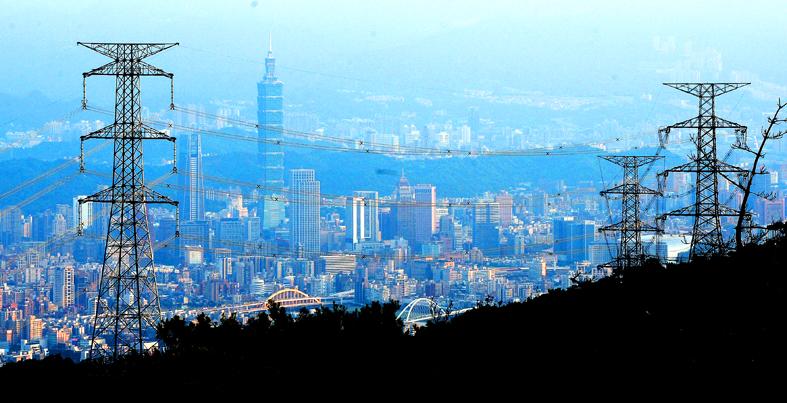Taiwan might be heading into another record summer of electricity use, Taiwan Power Co (Taipower, 台電) said yesterday.
First-quarter electricity use increased 3 percent year-on-year, with the last three days of last month breaking record peak use for March, the state-run utility said.
So far this month, power use is up 7 percent year-on-year. The most power used this month was on Thursday last week when 32.765 gigawatts (GW) were used in a day, up from the previous April record of 29.99GW.

Photo: Lin Cheng-kun, Taipei Times
The all-time record for single-day electricity use was set on July 23 last year, when usage reached 38.02GW.
“We expect that record to be broken this year,” Taipower manager Chang Ting-shu (張廷抒) said.
Taipower said that it was caught by surprise by how power use has been growing ahead of expectations, even before the arrival of the summer heat.
Increased domestic demand might have been caused by the stable economy, it added.
Taiwan’s electricity usage has increased year-on-year every year in the past few years, growing more than 2 percent last year.
Electricity generation capacity might also be strained by the water shortage, which has reduced first quarter hydroelectric power generation 16 percent year-on-year, Taipower said.
Chang said that he is still “confident” that Taipower will have the 10 percent reserve capacity necessary to handle summer peak demand, but it absolutely cannot do it without the four coal-fired generators in Taichung.
Taichung Mayor Lu Shiow-yen (盧秀燕) is blocking construction of two liquified natural gas (LNG) generators pending the decommissioning of the four coal-fired generators.
Chang said that delaying the construction of the new LNG generators would only delay the decommissioning of the older coal-fired generators.
“Mayor Lu is holding the construction of the new LNG generators hostage, but we cannot shut off the coal generators without creating a potential power crisis,” Chang said.
The new LNG plants would take five years to construct, he added.

NEW IDENTITY: Known for its software, India has expanded into hardware, with its semiconductor industry growing from US$38bn in 2023 to US$45bn to US$50bn India on Saturday inaugurated its first semiconductor assembly and test facility, a milestone in the government’s push to reduce dependence on foreign chipmakers and stake a claim in a sector dominated by China. Indian Prime Minister Narendra Modi opened US firm Micron Technology Inc’s semiconductor assembly, test and packaging unit in his home state of Gujarat, hailing the “dawn of a new era” for India’s technology ambitions. “When young Indians look back in the future, they will see this decade as the turning point in our tech future,” Modi told the event, which was broadcast on his YouTube channel. The plant would convert

‘SEISMIC SHIFT’: The researcher forecast there would be about 1.1 billion mobile shipments this year, down from 1.26 billion the prior year and erasing years of gains The global smartphone market is expected to contract 12.9 percent this year due to the unprecedented memorychip shortage, marking “a crisis like no other,” researcher International Data Corp (IDC) said. The new forecast, a dramatic revision down from earlier estimates, gives the latest accounting of the ongoing memory crunch that is affecting every corner of the electronics industry. The demand for advanced memory to power artificial intelligence (AI) tasks has drained global supply until well into next year and jeopardizes the business model of many smartphone makers. IDC forecast about 1.1 billion mobile shipments this year, down from 1.26 billion the prior

People stand in a Pokemon store in Tokyo on Thursday. One of the world highest-grossing franchises is celebrated its 30th anniversary yesterday.

Zimbabwe’s ban on raw lithium exports is forcing Chinese miners to rethink their strategy, speeding up plans to process the metal locally instead of shipping it to China’s vast rechargeable battery industry. The country is Africa’s largest lithium producer and has one of the world’s largest reserves, according to the US Geological Survey (USGS). Zimbabwe already banned the export of lithium ore in 2022 and last year announced it would halt exports of lithium concentrates from January next year. However, on Wednesday it imposed the ban with immediate effect, leaving unclear what the lithium mining sector would do in the